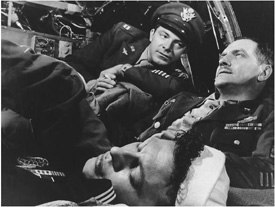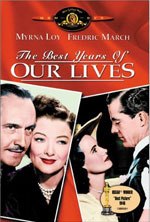Winner of seven Oscars, William Wyler's touching and honest drama about returning soldiers is as relevant today as it was when it was released more than 60 years ago. While there are no stories of war objectors spitting on returning vets from WWII, the Great Generation's fighters didn't have it easy either. This intimate tale chronicles the adjustments three very different men have to make in their civilian lives because of their experiences at war. They cover the economic spectrum, which makes adjusting to their normal lives more difficult or easier in interesting and ironic ways depending on the situation. Brought to life by a first-rate cast, there is a reason this film placed #37 on the AFI's Top 100 American Films list twice; it's a timeless classic.
Based on MacKinlay Kantor's novel, which was adapted by Robert E. Sherwood, winner of Best Screenplay, the story begins as three soldiers, strangers at the time, board a transport plane to get back home to Boone City. Fred Derry (Dana Andrews, LAURA) was a captain pilot during the war, but back home he worked as a soda jerk. A lower rank than Fred, Al Stephenson (Fredric March, 1931's DR. JEKYLL AND MR. HYDE) is an older man with a family, who as a civilian lives in a swank apartment and works at the bank. Homer Parrish (Harold Russell, PAYBACK) is a sailor, who after losing both hands now uses hooks. He worries that his girl Wilma (Cathy O'Donnell, BEN-HUR) will think differently of him when she sees him.
Upon arriving home, Al is uneasy, especially around his daughter Peggy (Teresa Wright, MRS. MINIVER) and son Rob (Michael Hall, BLOOD OF DRACULA), who have grown up so much in the three years he's been gone. His wife of 20 years, Milly (Myrna Loy, THE THIN MAN), is overjoyed about his return and encourages him to relax before jumping back into his normal life. Fred's return couldn't be more different. He arrives at his parents' home, a rundown shack by the tracks, where he learns that his wife Marie (Virginia Mayo, WHITE HEAT), who he married right before going off to war, has moved into an apartment in town, where she works at a night club. After looking all over for her, he ends up at Homer's uncle's bar where he runs into a very inebriated Al and the very irritated Milly and Peggy. Soon Homer arrives, fleeing the stares of his family. His uncle Butch (Hoagy Carmichael, TO HAVE AND HAVE NOT), who always looks out for him, encourages him to give his family more time to get use to his condition and for him to get use to them again.
Andrews, while never an outstanding actor, does a fine job here creating a man who found respect and honor in the service and now must accept that his life is back to where it was before the war. His marriage is a joke and he quickly falls for Peggy, a kind nurse who understands his hopes and dreams for a better life. March, who won the Oscar for his performance, struggles with his cushy life, thinking about his fellow soldiers who don't have it as easy as he does, or didn't return at all. To adjust, he often drowns his guilt in liquor. Milly is the supportive wife whose worried eyes show her concern for her husband's new ways. Loy brings her trademark sarcasm to the part, making the role her own and more than the sum of its parts. Wright's Peggy, in many ways, is a mirror of her mother, which is a stroke of genius. When she declares to her parents that she has made up her mind and she is going to break up Fred's marriage, we know she ain't fooling around.
As an amateur, Parrish gives a professional and powerful performance. It's not just how others look at him, but how he looks at himself. Usually putting on a happy face, Homer often hides from the world, especially Wilma, and explodes in outbursts of anger. Not expecting him to win Best Supporting Actor, the Academy gave him an honorary award for "bringing hope and courage to his fellow veterans." With that award and the acting award, he is the only actor to win two Oscars for the same performance. Sadly he didn't have a full career, not acting in another film after BEST YEARS until 1980.
In addition to Wyler's best director Oscar, THE BEST YEARS OF OUR LIVES took home Best Film Editing and Best Music, Scoring. Typical of classic Hollywood dramas, this well-plotted drama makes its core characters represent larger issues effortlessly. But Wyler and Sherwood never preach to us, they embody their message in wonderfully observed characters. With honest portrayals of the difficulties of acclimating oneself to life after war, the whole film brings hope and courage to veterans' stories, as well as the human condition.









